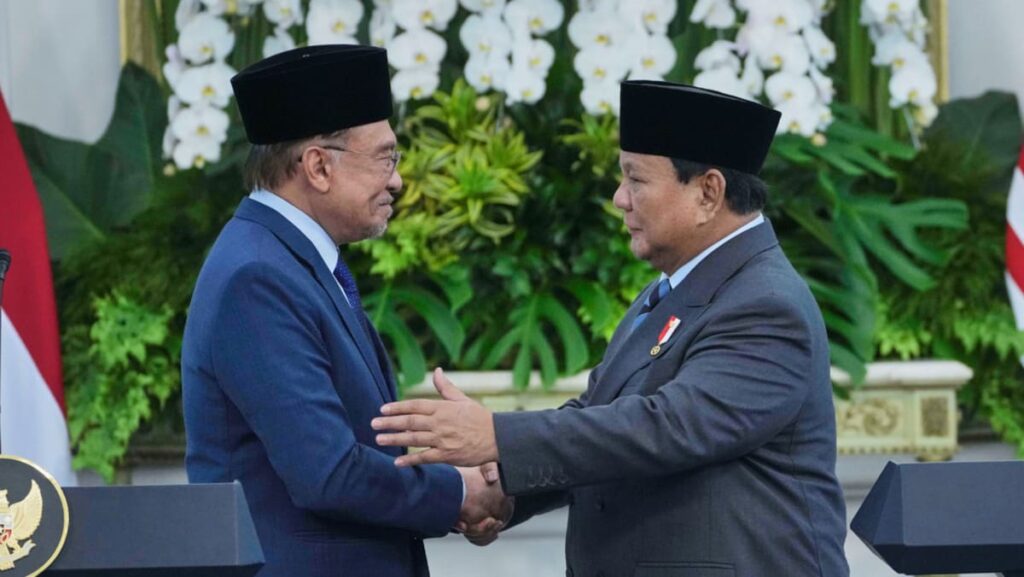THORNY ISSUES
One of the most significant issues the two countries are facing is a maritime dispute in an oil-rich area of the Sulawesi Sea, said analysts.
“Indonesia and Malaysia will likely talk about a unique proposal to develop the area in the Sulawesi Sea, the Ambalat area,” said Randy Nandyatama, an international relations lecturer at Yogyakarta’s Gadjah Mada University.
When Anwar and Prabowo met in Jakarta on Jun 27 to prepare for the annual consultation, they agreed to develop the block jointly.
“Whatever we find in the sea, we will exploit it together,” said Prabowo at a joint press conference with Anwar that day.
Meanwhile, Anwar said: “We should start joint development now to benefit both nations and support the local population.”
However, when members of parliament from Sabah, the Malaysian state closest to the disputed area, questioned Anwar in parliament on Jul 22, he stressed that no final agreement had been reached, as discussions were still ongoing.
While Anwar said he would continue with the approach of negotiating territorial disputes with a “friendly country” such as Indonesia, he maintained that the principle of sovereignty remained Malaysia’s top priority.
The dispute dates back to 1979, when Malaysia published a map indicating its territorial waters and continental shelf boundaries. Indonesia and other neighbours such as Brunei, the Philippines, Thailand and Vietnam did not recognise this map.
The Sulawesi Sea dispute has been difficult to resolve as it involves overlapping claims of both maritime boundaries and the sovereignty of two island features, Pulau Sipadan and Pulau Ligitan.
In 2002, the International Court of Justice awarded the two islands to Malaysia, but did not settle the overlapping maritime boundaries. The area has experienced periodic flashpoints over the years as the countries have attempted to resolve the dispute.
Adib Zalkapli, director of geopolitical consultancy Viewfinder Global Affairs, said there are expectations that significant progress will be made on the Sulawesi Sea issue.
“The two countries could potentially agree on joint development efforts to extract resources in the area without resolving the overlapping claims. Malaysia has done this before with Thailand,” he said.
While RSIS’ Jamil said the upcoming consultation is unlikely to yield a full resolution, he believes the talks could produce a framework agreement or joint statement outlining the terms of a joint development authority.
Sabah Chief Minister Hajiji Noor will be present in Malaysia’s delegation for the meeting, a move Jamil called “politically significant”.
“Including Sabah at the negotiating table ensures local buy-in, lends legal credibility, and helps the federal government manage domestic sensitivities around sovereignty,” he said.
Earlier discussions between the countries did not see adequate Sabahan representation, said Bridget Welsh, an honorary research fellow at the University of Nottingham Malaysia’s Asia Research Institute.
She told CNA that Hajiji’s attendance is important.
“I think there needs to be broader stakeholder buy-in on the sensitive border issues … For Sabah, what will be clear is their share of the oil revenue,” she told CNA.
Randy from Gadjah Mada University stated that the proposal to develop the disputed area jointly requires further discussion.
“The Malaysian side will need to consult parliament on the issue, while the Indonesian government will also need to do the same with its House of Representatives,” he said.
Analysts said Anwar and Prabowo could also discuss other long-standing thorny issues, including the treatment of Indonesian migrant workers in Malaysia and the problem of transboundary haze.
However, it is unclear whether they will be discussed in detail, given that Malaysia’s manpower and environment ministers are not among the delegates.
The treatment of Indonesian migrant workers in Malaysia has been a recurring issue for both countries. A significant proportion of these workers are irregular migrants who often work in very poor conditions in the domestic, construction and agricultural sectors.
Forest and peatland fires are a primary cause of the recurring issue of transboundary haze, an annual problem for Indonesia and its neighbours, including Malaysia, Singapore, and southern Thailand.
https://www.channelnewsasia.com/asia/indonesia-malaysia-anwar-ibrahim-prabowo-subianto-5262361


